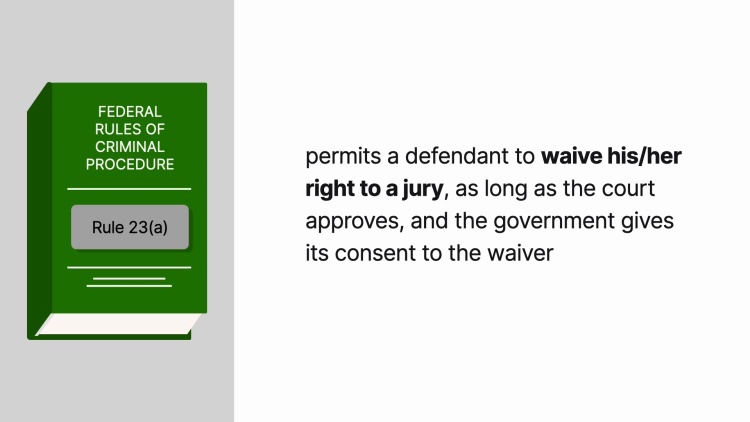Singer v. United States
United States Supreme Court
380 U.S. 24, 85 S.Ct. 783, 13 L.Ed.2d 630 (1965)
- Written by Robert Schefter, JD
Facts
Singer (defendant) was charged by the United States government (plaintiff) in federal district court with 30 counts of mail fraud. At the start of the scheduled jury trial, Singer offered to waive his right to a jury trial in order to save time. Rule 23(a) of the Federal Rules of Criminal Procedure (FRCP) allows a defendant to waive the right to a jury trial with the approval of the court and the consent of the government. The trial court was willing to approve the waiver, but the government refused to consent. Singer was convicted by a jury on 29 of the 30 counts. Singer appealed, challenging FRCP 23(a) on the basis that Article III, Section 2 of the United States Constitution and the Sixth Amendment guarantee not only the right to trial by jury, but also the right to waive a jury trial in favor of a judge trial. The court of appeals affirmed. The United States Supreme Court granted certiorari.
Rule of Law
Issue
Holding and Reasoning (Warren, C.J.)
What to do next…
Here's why 899,000 law students have relied on our case briefs:
- Written by law professors and practitioners, not other law students. 47,000 briefs, keyed to 994 casebooks. Top-notch customer support.
- The right amount of information, includes the facts, issues, rule of law, holding and reasoning, and any concurrences and dissents.
- Access in your classes, works on your mobile and tablet. Massive library of related video lessons and high quality multiple-choice questions.
- Easy to use, uniform format for every case brief. Written in plain English, not in legalese. Our briefs summarize and simplify; they don’t just repeat the court’s language.





